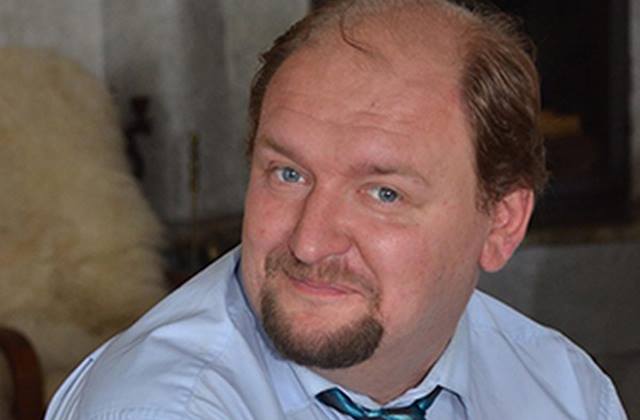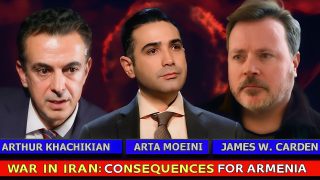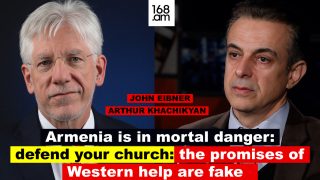“Armenia’s Authorities Appeared in not such an Advantageous Situation”

These days the second NATO summit was over, within which officials of NATO member countries stated the resolutions of cornerstone importance to the world. “168 Hours” talked to Sergey Gerasimchuk, Ukrainian analyst, Head of International program of Group of Strategic Studies and Defence Studies (Ukraine) around the summit results.
Mr. Gerasimchuk, during Warsaw Summit Communiqué, heads of NATO member countries were claiming in their speeches, that they’re ready for “constructive relations” with Russia, as soon as Moscow is ready for that, and prior to that the alliance is going to restrain Russia’s possible attack on a few directions, even by deploying multi-national battalions in Baltic countries and in Poland. In your opinion, what was this summit marked by?
On the whole, this summit may be qualified as successful in the period of NATO’s recent history, as, after all that, when throughout lasting period statements were heard, that peace is needed among NATO member countries, there were suspicions around whether the alliance will defend all its member countries pursuant the agreements, in case, when there are small countries, big countries, big actors, Warsaw summit showed that there is peace among them.
And even if prior to the Summit Francois Hollande, president of France, stated that Russia isn’t an opponent, but a partner, the Summit manifested peace towards countries, which Russia may challenge. Naturally, deploying of battalions in Poland, Lithuania, Estonia and the fact, that big actors will stand on the basis of formations of those battalions, i.e. the countries, which will be responsible for its formation. It refers the USA, Canada, Great Britain and Germany, in this case not only inter-European solidarity was manifested, Germany appeared in favor of protection of Eastern bloc, but also of Euro-Atlantic solidarity, as Great Britain and the USA don’t deny their Trans-Atlantic ties and manifest solidarity. This was important.
There were some disappointments as well, which should also be mentioned. It’s southeastern direction, where Romania’s initiative didn’t gain any support in establishing NATO’s Black Sea permanent fleet, although the initiative was being touched upon for over a year, rather serious talks have been launched to that end. Although I consider, NATO will reflect to this in its next summit to be held in Brussels.
NATO’s concluding Communiqué doesn’t mention about the Crimea, however, the topic of Ukraine dictates the intonation of the document, which means that the crisis in Ukraine served as a ground for the new policy. On account of this circumstance how may results of the summit be assessed for Ukraine?
We may speak of evident progress regarding Ukraine, as a system of big events, projects were promised to Ukraine, which will support strengthening of security. It’s noteworthy that in case of NATO-Russia dialogue something bearing a declarative nature might be proposed to Ukraine, however, we were offered a serious support, allocation of NATO parliamentarians, who will follow implementation of those events, which facts, that NATO observes Ukraine as a serious partner.
In your opinion, are these decisions enough to counteract Russia’s steps?
On the one hand, it may seem at first sight, that deploying thousands of soldiers isn’t enough against what Russia may give, and the latter speaks of ten thousands of military units. On the other hand, obviously, in case of any provocation by Russia the price will be rather high, if Russia implements provocation or attack against the battalion, among which militants of Germany, Canada and the USA may be found, those leading powers may perceive that step as attack against their own countries.
Undoubtedly, NATO’s mechanisms will be implemented, i.e. this is a progress. Both Ukraine and Georgia would like more, we’d like membership action plan (MAP), we’d like perspective for membership, but they still assure of the policy of open doors, however, they don’t provide a plan. On the other hand, it’s much better, then it might be expected, on account of the circumstance that NATO has permanently kept cautiousness in relations with Russia, up to now NATO is interested in developing relations with Russia in other hot points, including Iraq and Syria. Thus, we got the maximum from this Summit, which might have been anticipated under current conditions. In any case, there is a perspective for another summit, where, I think, the issue will be reflected.
As you claim, NATO is opening a new policy in its relations with Russia. It’s interesting to know, how will this be reflected in relations with Armenia, which is Russia’s strategic partner, has a military base and good ties with NATO. What perspective does Armenia have within this new policy?
Armenia’s authorities appeared in a situation not so favorable to them, as NATO, on the one hand touches upon the fact, that it’s not a threat for Russia and is ready for a dialogue with those countries, when Russia will be ready for that. On the other hand, Russia is rather nervous about expansion of NATO and I don’t exclude that Russia will press its partners so that relations with NATO will be reached to the minimum or be completely suspended.
We need to frankly say, that we are entering a new paradigm of Cold War, very few succeeded to sit on two chairs. Of course, movement of non-involved countries was observed, however, on the other hand, I think, possibly there will be such countries, meanwhile Armenia isn’t ranked among those countries, as Armenia is mentioned as Russia’s partner, and it may have its role. The attempt of sitting on two chairs may end by the fact, that cooperation with NATO will be suspended and relying on Russia will be impossible.
There are opinions in Armenia, that in the context of this policy wider opportunity has provided to Armenia to “leave” Russia. What do you think, does Armenia have such a possibility?
It’s an interesting question. At large, I don’t exclude that Armenia has such a possibility, however, for this it’ll be necessary to record a shift to more neutral positions. By its steps, including voting at UNO GA, Armenia expresses its support to Russia. If there is such a label, first and foremost, one needs to work on the image of the country, which adopts resolutions at a sovereign level, and after it one may speak of new relations with the West, i.e. Armenia needs to show, that the Yerevan itself is making its decisions.
By Araks Martirosyan

























